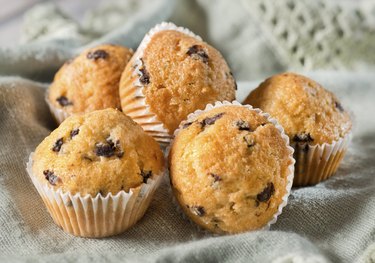
To excel in bodybuilding, you need to work out intensely to increase your muscle mass and reduce your levels of body fat. However, this process won't be easy unless you dedicate yourself to proper nutritional practices. In addition to eating a high-protein diet to build muscle, you might want to engage in carbohydrate loading before your contests. Carb loading provides the best results when you eat the right types of foods, so choose carefully.
Carb Load Benefits
Video of the Day
As bodybuilder Layne Norton explains, carb loads can help fill out your figure, making you look more defined and muscular. In the days leading up to your contest, you should consume a low-carb diet to rid your body of excess water weight. This can make your muscles appear flat, so a carb load can pump you up. Norton suggests consuming carbs that are low in fiber and not bulky, and so are digested easily.
Video of the Day
White Rice
White rice can be an effective carb-loading choice because it is rich in carbs and provides minimal fiber. In addition, white rice is fat free, which the Australian Institute of Sport notes is important for carb loading -- fat slows down digestion. A 1/2 cup serving of uncooked rice provides 160 calories, with 26 g of carbs and no fiber.
Blueberry Muffin
Blueberry muffins can be ideal for carb loading because they are calorie-dense, rather than bulky. In addition, blueberry muffins are rich in carbs thanks to the flour and the fruit. A 4.25 oz. blueberry muffin provides 66 g of carbs, with about 5 g of fat. Be sure to watch fat content when consuming baked goods, as they can be rich in fat.
Spaghetti
Spaghetti is an ideal food choice for a carb-loading bodybuilding diet because spaghetti is low in fat and rich in carbs. One cup of cooked spaghetti provides 220 calories, with less than 1.5 g of fat, 43 g of carbs and only 2.5 g of fiber. Avoid creamy sauces and meatballs, as those are high in fat.
Bagels
Bagels are effective carb-loading foods because they are calorie-dense, meaning they are high in calories despite not being particularly large. A 2.75 oz. bagel offers 215 calories, with 42 g of carbs. Bagels are low in fat and fiber, as a 2.75 oz. bagel contains 1 g of fat and 3 g of fiber. Adding jelly or jam will increase the carb count, but you should avoid peanut butter and cream cheese, as those spreads are high in fat.
Related Reading
Marathon runners, endurance cyclists and elite athletes all know the feeling when, during a big competition or long training session, energy levels plummet. This is due to a lack of readily available fuel to power the muscles. Hitting the wall like this can potentially turn you from beating your best time to falling way behind the pack, but you can help prevent it by implementing a dieting strategy known as carbo loading.
The Theory
When you exercise, your body uses glycogen -- a form of carbohydrate stored in the liver and muscle cells -- to provide energy. At some point, however, this glycogen runs out, and you experience a drop in performance as fatigue sets in. Topping up your glycogen stores before an event by carbo loading can prevent this, leading to a potential increase in your energy and endurance.
The Benefits
According to sports nutritionist Nancy Clark, under normal dietary circumstances an athlete has around 80 to 120 millimoles of stored glycogen per kilogram of body weight -- or around 36 to 55 millimoles per pound -- but a carb-loaded athlete can have up to 200 millimoles per kilogram, or 90 per pound. This can improve endurance by 2 to 3 percent, which could be the difference between winning and losing.
The Plan
Before you load carbohydrates, you first have to deplete your carb stores. This is to trick your body into thinking that there's a problem with your glycogen stores, so it compensates by storing more when you load, notes athletics coach Brian Mackenzie. According to the Australian Institute of Sport, you should deplete for three to four days by eating a low-carb diet, then load for three to four days. During this load you need around 7 to 12 grams of carbohydrate per kilogram of body weight each day, or 3.2 to 5.5 grams per pound.
Putting It Into Action
When carbo loading before competition, it's important that you have a trial run at least a couple of weeks beforehand. This is so you can determine exactly how many carbs you personally need to feel energetic and perform at your best. Additionally, carbo loading works far better if you choose foods that minimize gastrointestinal stress, so experiment with different food combinations before the big day. Check with your doctor before implementing a carb0 load and ask your coach for advice if it's your first time.